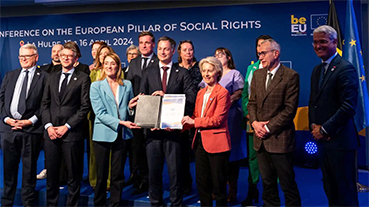The Belgian municipality of La Hulpe hosted the high-level conference on the European Pillar of Social Rights on 16 April. Hosted by the Belgian Presidency of the Council of the European Union (EU), the European Commission, the Parliament and the Council of the EU, the Conference concluded with the signing of a Declaration, which renews the commitments of the EU institutions and civil society for a stronger social Europe.
Signatories of the La Hulpe Declaration on the Future of the European Pillar of Social Rights were the President of the European Parliament, Roberta Metsola; the President of the European Commission, Ursula von der Leyen; the President of the EESC, Oliver Röpke; governmental representatives from 25 countries (all EU member states except Austria and Sweden); the general secretaries of the European Trade Union Confederation; SGI Europe; SMEunited; as well as the president of Social Platform.
According to the Declaration that should serve as a compass, all these actors are determined “in the pursuit of a social Europe”, aiming to create social and economic conditions for progress, “ensuring equal opportunities for all, quality jobs and fair work, poverty and inequality reduction, and promoting a just and equitable society.” The text proposes initiatives for the EU’s future social agenda in the next legislature and reaffirms the Pillar as the guiding framework for EU social policies.
The signatories reiterate that economic and social progress are intertwined, and that the European Pillar of Social Rights is part of broader efforts to build a more inclusive and sustainable growth model, and also to achieve the Sustainable Development Goals. “This fosters social and territorial cohesion and contributes to improving Europe’s competitiveness, making it a better place for businesses, including SMEs and social economy enterprises, to invest and create quality jobs” (point 6 of the Declaration).
The document, which includes aspects of equality and labour market access, decent work, social protection, inclusion, and governance, directly refers to the social economy in its point No. 23, stating: “The social economy proposes a model of social and economic development capable of offering high-performance, inclusive, and sustainable economic activities that serve the collective interest. We recognize the added value of the Council Recommendation on developing the framework conditions for the social economy, also in the context of the San Sebastian Manifesto and the Liege Roadmap for the social economy in the EU.”
At the end of the Conference, Belgian Prime Minister Alexander De Croo stated: “We have worked hard to find broad consensus around an ambitious Declaration that reaffirms the European Pillar of Social Rights as our joint compass on the path towards a caring, prepared, and protected Europe, and to ensure that our labour markets and social models are ready and resilient to address the multiple challenges ahead,” said the Belgian Prime Minister.
For more information:
European Pillar of Social Rights
Action Plan for the European Pillar of Social Rights
Eurobarometer Survey on Social Europe
La Hulpe Declaration on the future of the European Pillar of Social Rights







